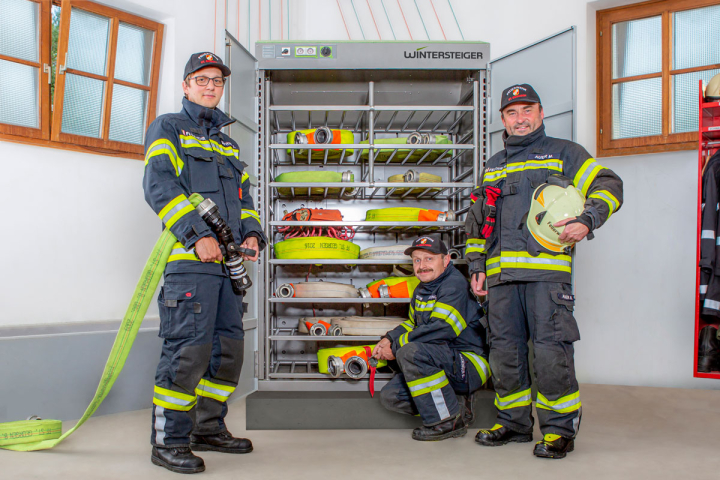18.07.2019
Unique to Drytech: A drying locker that uses the condensation process to dry fire hoses
 The St. Georgen volunteer fire department's new condensation drying locker for fire hoses. From left to right: Erich Hackinger, Joachim Unfried, and Chief Fire Inspector and Fire Chief Markus Auer
The St. Georgen volunteer fire department's new condensation drying locker for fire hoses. From left to right: Erich Hackinger, Joachim Unfried, and Chief Fire Inspector and Fire Chief Markus Auer
Instead of building a drying tower, the St. Georgen volunteer fire department decided to purchase a Drytech drying locker from Wintersteiger.
Previously, the fire department dried their hoses using an inclined hose drying system, in which the fire hoses are suspended between the ceiling and the floor at an angle of 30°. Not only was this laborious, the drying result was also not ideal: the hoses sagged in the middle or hung together at the edges, therefore remaining wet.
The Multi Eco drying locker for fire hoses is a special solution that was implemented especially for the St. Georgen volunteer fire department. Chief Fire Inspector and Fire Chief Markus Auer says: “The most important advantage is obviously the cost. A drying tower would have been a significant investment. We were looking for another solution when we stumbled upon the Wintersteiger drying lockers for clothing online. Wintersteiger were very helpful and converted the locker to suit our needs.”
SHARE:
Another advantage of the drying locker is the fast drying time, as the hoses are dry in just a few hours. Until now, the hoses had to be hung up for a week until they were dry. A timer clock is used to set the drying time. In the summertime, when severe weather conditions mean that the hoses need to be used more often, the shorter drying time is a big bonus. “The hoses are rolled up tightly and placed in the drying locker. Once they are dry, the hoses just need to be tensioned and put away,” explains Markus Auer.
Energy efficient condensation drying.
The energy consumption of the Multi Eco is very low as the drying locker uses condensation drying. With this method, the moisture is extracted from the material, cooled on copper tubes, and discharged from the locker into a separate container as condensation. Ventilation systems are therefore not necessary. The drying locker uses approximately 60 % less energy than conventional drying solutions.












